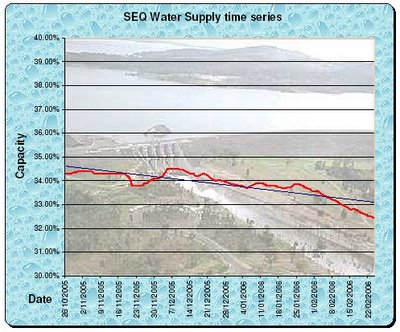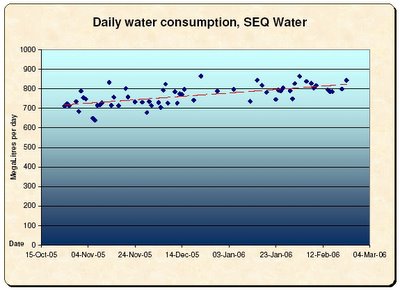Drink only beer
The water supply situation in Brisbane just keeps on getting worse.
The city's three water sources, Wivenhoe, Somerset and North Pine dams are now down to 32.45%. Level 3 restrictions, kicking in at 30%, now seem likely than any easing.
Put simply, it hasn’t rained… again. Through late November and December, South East Queensland experienced numerous, intense, but isolated tropical storms. The dams rose a little, but so bad has been the drought to date, any rainfall essentially soaked into the parched ground before it thought about running-off.
Upstream farmers have refilled their on-farm storage, but the storage areas for Brisbane have stubbornly refused to move.
But since then, nothing but clear skies. Dam levels are now rapidly dropping off fast, from a 'high' summer point of 34.50%. The traditional wet season has just 2 weeks left.
Making things worse, residential demand is back on the up (see right). Following a major publicity campaign accompanying the roll out of a new water restriction regime, Brisbane residents slashed their consumption drastically. Now, it seems 'savings fatigue' has set in and the trend line is up 16% since late October. Brisbanites' thirsty gardens are more important than long-term water security.
The long-term weather outlook predicts a 45-50% chance of above average rainfall over the next 3 months .
Dam levels have been this low in February before , but have recovered, but for this to happen, it needs to start raining yesterday.
Arguably, Brisbane is the midst of the dry cycle, the last one occurring when the population was much less thirsty and less populated. But if this is the case – and the water planners have misjudged our long-term dam yields - the situation is even more pressing.
Until yesterday, the answers seem to lay in buck-passing and prevarication; demand the population reduces their consumption and eventually it will rain. We can then all sit down and wait for it to blow over.
Two key strategic documents: the South East Queensland Regional Water Supply Strategy and the South East Queensland Regional Plan 2005-2026, have set out an action plan and a number of options for exploration, but so far little has been done to actually secure a sustainable water supply.
When these two documents were drawn-up in mid-2005, the 'water crisis' was something that was going to happen in the future – in 2025 – when demand will meet current available yield – all things being equal. Again, they assumed it was going to rain, like it always does.
Up to now, the only tangible remedial work is Brisbane City Council's proposal to begin prospecting for aquifers, to supplement dam supply. $30m will be spent on investigating the feasibility of 40 bores in 8 locations around the city. If all 8 prove to be 'sustainable' (the Council's terminology, not mine) and the water quality is sufficient, they could supply 20m litres each day.
But 20m litres a day represents just 2.5% of Brisbane's consumption. This bore hole gig is nothing but politicians clutching at straws.
Alternatives on the books include desalination or accessing what is [hopefully] a giant artesian basin underneath the Sunshine Coast hinterland.
No doubt about it, Brisbane has a big problem. If it doesn’t rain (unlikely), the water we have to supply a city of 1.5m people will run out in 24 months. A developed-world city will face a water crisis.
But who is to blame?
- Councils, for not investing in adequate mega-infrastructure to meet the growing population?
- Bureaucratic wrangling between State and Councils over public health and use of private rainwater tanks?
- Bureaucratic wrangling between Councils and their water companies over water ownership and use of private rainwater tanks?
- Federal government and immigration policies, bringing in too many people?
- Australians, for using each using too much water, living on the driest continent on the planet?
- No one, it just hasn't rained
- Anthropogenic global warming?
Probably all of them, to differing extents. But the biggest issues is finding an answer
- More dams? – Surely not. Firstly it takes years to fill the dams and even that is built on the proviso there will be average rainfall. Furthermore, it is doubtful there are many more suitable places, not settled and not protected. However, one major new dam is planned.
- Desalination? – Could be brought on-stream within 2 years but I am not sure this is the answer when we should be cutting greenhouse gas emissions. To generate drinking quality water requires a phenomenal amount of energy. Furthermore, the hyper-saline waste product presents its own problems for ecologically benign disposal .
- Bore holes? – It seems unlikely that sinking boreholes will supply anything like enough water and it is doubtful it would be of sufficient quality to enter the mainstream. Industrial and horticultural use would be appropriate.
- A diverse and integrated approach to water supply and demand management? – This will include rainwater harvesting, grey-water recycling (supply), use of efficient appliances and leakage control (demand).
It also requires a new ethic. Despite the dire situation, people can still pour an unlimited amount of drinking quality water onto their gardens (provided they pay for it). My neighbour religiously waters every available morning for 20 minutes, probably using as much water as our entire household uses in one day. This surely cannot continue.
Furthermore water supply must be geographically diversified. The current paradigm of mega-dams is not suited to current weather patterns where rainfall is fragmented, but heavy. Water planners are now concluding that we can no longer rely on historical trends to determine future supplies. Harvesting must be decentralised and built on a redundancy system, where each household, street, suburb, city and region has appropriate-sized capture and storage and between which water can flow between areas of need.
My personal contribution (despite our excellent record of efficient water use in our household) is to make a binding, committed decision to drink no water, only beer.
| I am employed by Brisbane City Council. All views expressed in this blog are my own and in no way reflect the views of my employer. |
From WeaselWords.com.au
0 Comments:
Post a Comment
<< Home